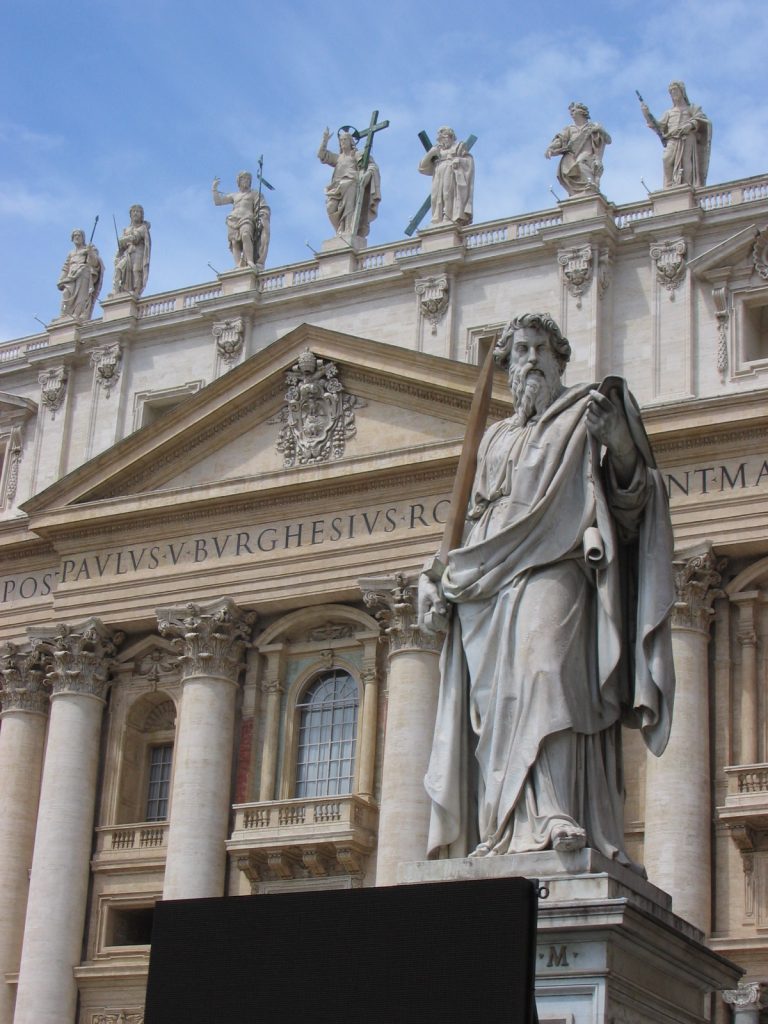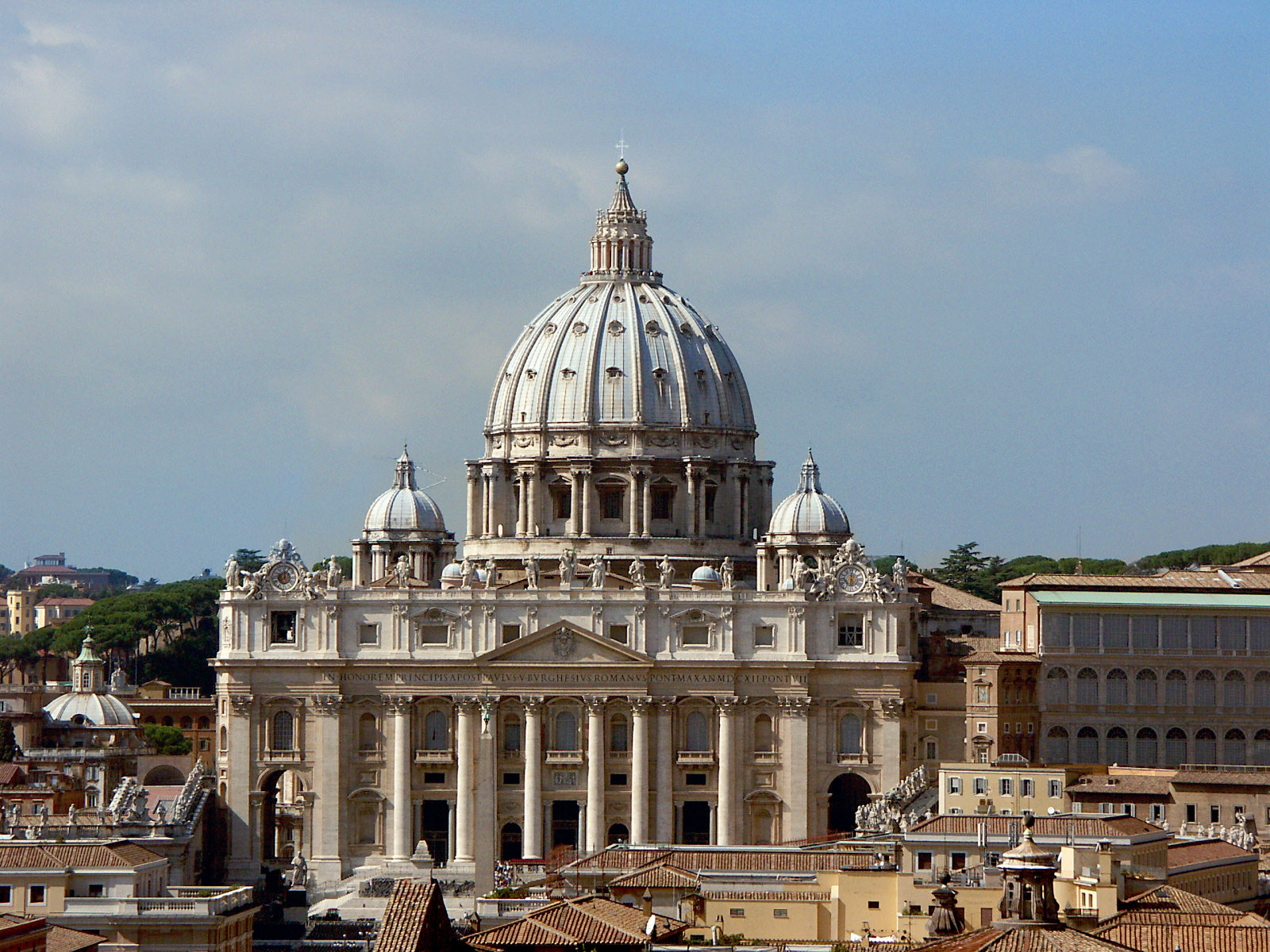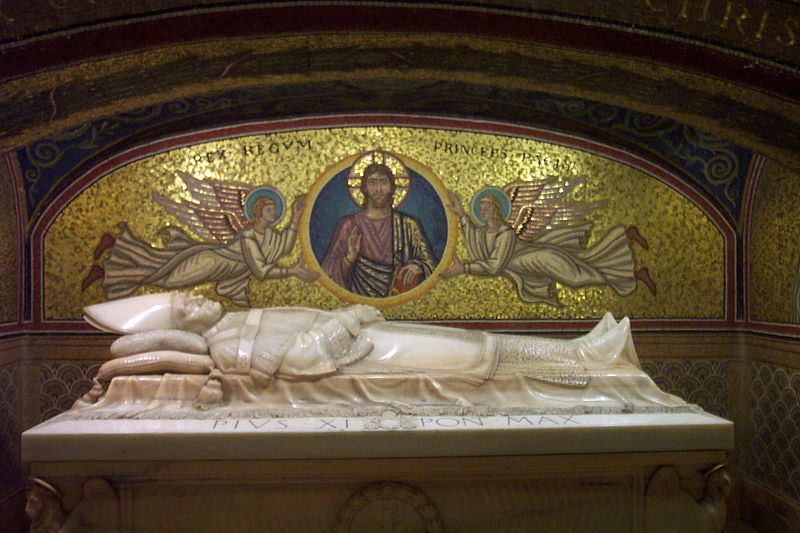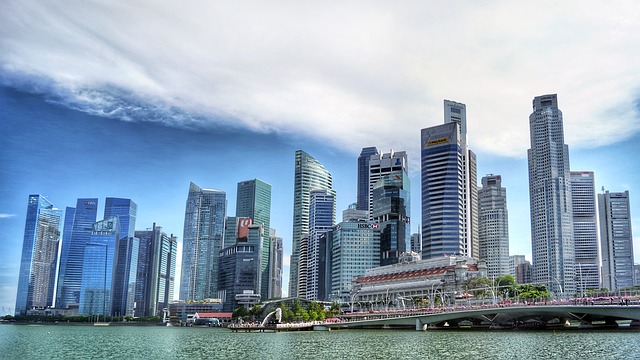
St. Peter’s Basilica is one of the holiest sites in Christendom! Infused with opulent architecture and history, this magnificent monument is a late renaissance church of the Vatican City. Known to be the burial site of Saint Peter, one of the twelve apostles of Jesus, St. Peter’s Basilica is a must visit for all history enthusiasts.

Image Source – https://upload.wikimedia.org/wikipedia/commons/d/d6/St_Peter%27s_Square%2C_Vatican_City_-_April_2007.jpg
History Retold
In 64 AD, during the reign of the Roman Emperor Nero, St. Peter, one of the 12 apostles of Jesus was crucified and buried at the Circus of Nero. To pay reverences to the great man’s tomb, in 324 AD Emperor Constantine started constructing a magnificent Basilica over the tomb. Five years later, the Basilica was consecrated and transformed into a longitudinal building with a nave, four aisles and a transept.

Image Source – https://upload.wikimedia.org/wikipedia/commons/c/c5/St-peter.jpg
Pilgrims travelled on foot from all over Europe in the early 14th century to pay respect to the tomb of the ‘Prince of the Apostles’ as he was popularly called. In the mid-15th century, the old Basilica was rebuilt. Pope Nicholas V asked architect Bernardo Rossellino to make additions to the old church. However, the idea was abandoned for some time, and it was only in the late 15th century that Pope Sixtus IV built the Sistine Chapel near it.
What we see today was started by Pope Julius II in 1506. He entrusted Donato Bramante, a great architect of his time, with the task of making the monument. However, the work was abandoned for a while as Julius II, and Bramante both died. Many new proposals were drawn up for St Peter’s Basilica in the next 40 years. Finally, in 1547, Pope Paul III asked the Michaelangelo to make a new design which was put together and ready in 1626.
What to See
St. Peter’s Basilica is a great place for those seeking mental peace and unending solace. Its grand interiors and exteriors make it an interesting tourist sight. Some of the parts worth seeing are:
The Grand Building

Image Source – https://upload.wikimedia.org/wikipedia/commons/1/15/Petersdom_von_Engelsburg_gesehen.jpg
Grand, impressive and magnificent describe this historical monument to the hilt. Termed as the largest church in the world, it has a 218-meter long nave. Its dome is the world’s largest; 42 meters in diameter and 138 meters in height with the largest interior that any Christian church in the world would have, housing 60,000 people. Many famous artists have adorned the 45 altars of this church. Some of the best works are the Pietà by Michelangelo, the papal altar and the Throne of St. Peter by Bernini and the Monument to the Stuarts by Canova.
St. Peter’s Square
A fitting approach to this great monument is the massive, elliptical St. Peter’s Square. Bernini designed it, and it was built between 1656 and 1667. Adorned by two beautiful fountains, the centre of the square has a 25.5-meter-tall obelisk from the 13th-century BC Egypt. A monumental colonnade outlines the square. Its open arms symbolise a grand welcome for the ones getting inside the Catholic Church.
The colonnade features 140 statues of saints made between 1662 and 1703. Near the stairs to the Basilica in the front of the square, stand colossal statues of St. Peter and St. Paul.
The Dome
The dome of the cathedral is one of Michelangelo’s best artwork. This glorious double dome is 42.3 metres in diameter and 120 metres above the floor. Sometime in the early 18th century, the dome got a few cracks, so four iron chains were installed to bind it. This dome is a parabola with a vertical thrust. Its bold ribbing in the paired Corinthian columns which seem to be a part of the drum, are in reality away from it to absorb the dome’s weight. If you climb up to the top of the dome, a spectacular view of Rome awaits you.
Grandiose Interiors

Image Source – https://upload.wikimedia.org/wikipedia/commons/9/90/Interior_of_St._Peter%27s_Basilica_3.jpg
Calling the interiors of St. Peter’s mere impressive is an understatement as it is the largest church in the world. Every bit of the church showcases the finest Renaissance monuments and decorations possible given the talents of great artists like Michelangelo and Bernini. The interior of this cathedral is resplendent with rare marble and mosaics of all colours.
Crypt

Image Source – https://upload.wikimedia.org/wikipedia/commons/thumb/5/5d/PiusXItomb.jpg/800px-PiusXItomb.jpg
The crypt beneath the church is definitely worth a visit. It has architectural fragments from other churches on site along with tombs of many popes. However, the main focus lies on the tomb of the first pope: St. Peter. A glass wall at the end of the crypt gives a view of the reliquary below the altar, which might have the actual bones of St. Peter.
Nave

Image Source – https://upload.wikimedia.org/wikipedia/commons/1/14/Nave_of_St._Peter%27s_Basilica_01.jpg
Inside the central doors, a large round porphyry slab is placed inside the floor. Charlemagne and the Holy Roman Emperors knelt down here for their coronation. The floor of the nave has markers with the comparative lengths of other churches. The pilasters have niches with 39 statues of various saints. The Northwestern corner of the nave houses the bronze statue of St. Peter Enthroned.
Right Aisle and Right Transept
The right aisle has Michelangelo’s beautiful Pietà, depicting the Virgin Mary cradling the dead Jesus in her lap after his crucifixion. If you walk up the aisle, you will see the monument of Queen Christina of Sweden, who had abdicated to convert to Catholicism. You can also look at the monuments of Pope Pius XI, Pope Pius XII and the altar of St Sebastian.
Bernini’s Baldacchino

Image Source – https://upload.wikimedia.org/wikipedia/commons/9/9c/Basilica_di_San_Pietro%2C_Rome_-_2677.jpg
Baldacchino, a monumental canopy shelters the papal altar and the holy relics of St. Peter. Lorenzo Bernini made this awe-inspiring structure with 927 tons of dark bronze, accessorised with gold vine leaves. The Baldacchino has the symbols of the Barberini family with a golden sun and bees. It is meant to represent the union of the Old Testament Wisdom of Solomon, the Christian practice of Constantine, and the rebirth of a triumphal church with the help of the Barberini family.
Left Transept and Left Aisle
The Chapel of the Column stands at the end of the left aisle, west of the transept. It has the altar of ‘Our Lady of the Column’ on the southern side. It has an ancient image of the Virgin Mary painted on a marble column in the central nave of the original Basilica. It was placed on this altar in 1607.
Altar of Pope St. Leo the Great is also placed in the same chapel on the left of the altar. The left transept holds the altars of St. Peter’s Crucifixion, St. Joseph and St. Thomas. Clementine Chapel and the Presentation Chapel are also a part of it.
An architectural paradise, St. Peter’s Basilica is a testament to over 2000 years of Christianity. It has the magical ability to spellbound visitors with its holy embrace. So take a dip into this sacred ocean of spirituality and relish the architectural and historical extravaganza with SOTC’s Vatican City tour packages.





Related Post
10 Famous Pilgrimage Destinations for Mahashivratri 2025 Celebrations
Mahashivratri Festival 2025: Date, History, and Key Celebrations
Guide to Marine Life in Andaman and Nicobar Islands
10 Best Places to Visit in April Outside India – Where Will You Go Next?
10 Hottest Places on Earth With The Highest Temperature Ever Recorded
Braving the 5 Coldest Places on Earth: Your Ultimate Guide to Surviving Extreme Chill
Places to Visit in January, February and March (2025)
Top 9 Honeymoon Places in India in 2025 for a Romantic Escape
Kick Start the Year with 11 Must-Do Adventurous Things to do in Andaman (2025)
15 Best Honeymoon Destinations in India in May (2025)